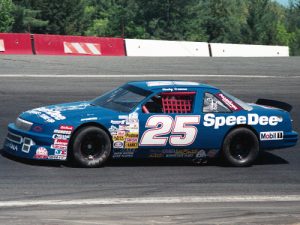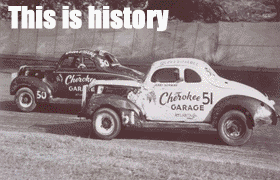
Ricky Craven, seen here from earlier action, scored the 1991 NASCAR Xfinity Series victory at New Hampshire Motor Speedway on October 13, 1991. Photo: NASCAR Media
New Hampshire Motor Speedway in Loudon, New Hampshire is fittingly both an important part of NASCAR history and a unique treasure in modern day sports venues.
Its idiosyncrasies are exactly what make “The Magic Mile” a must-stop on the NASCAR calendar, popular among competitors and fans alike. Plus, like many of the tracks on the schedule it has played a significant role in the sport.
The NASCAR Cup Series makes its only stop of the season at New Hampshire this weekend for Sunday’s NASCAR Cup Series race and Saturday’s NASCAR Xfinity Series event.
It’s quite the journey from the track’s origins – a 1.6-mile road course opened in 1964 called Bryar Motorsports Park to the current 1.058-mile oval featuring progressive banking. But when New England’s own Bob Bahre purchased the facility and converted the track into the oval – big time racing had a home and an immediate supportive audience. And in 1990, Bahre’s track hosted its first NASCAR race – a Xfinity Series event won by driver Tommy Ellis.
NASCAR had found a home and New Hampshire Motor Speedway was – and still is – considered THE NASCAR track for the Northeastern fan base – some of racing’s most passionate supporters as the stock car circuit is reminded upon each summer visit there.
“I remember watching it sort of sprout from the ground and take shape,” said former NASCAR star Ricky Craven, a native of Maine. “The speedway was exciting in terms of fans and became New England’s largest sport’s facility, but for the drivers, it was also incredible and for me personally, it was monumental in terms of timing because I was creating some inertia in my career and needed people to be able to see me, so I was just so enthusiastic about it.
“I won the Chevy Dealer’s 250 in ’91 and it propelled my career – a battle with Harry Gant and Chuck Bown in the closing laps and got me a lot of attention,” he added. “It was a televised race and there were no races in New England televised nationally.
“And it had that same effect on so many people, really. If you think about all the talent that has come from New England since the track was built – and I’m talking Tommy Baldwin, Steve Park, hundreds, if not thousands of crew members that eventually made it to the big time. The timing of that speedway was so valuable to us young competitors in particular.
“We had a platform to perform on. All of a sudden we had a home court.”
And as it quicky proved, valuable to the sport in general.
After a successful three-year run with the NASCAR Xfinity Series from 1990-92, New Hampshire Motor Speedway earned a NASCAR Cup Series race becoming a must-see venue for both New Englanders and nearby Canadians – and both country’s national anthems are proud features in pre-race festivities.
NASCAR Hall of Famer Rusty Wallace won the first NASCAR Cup Series race there in 1993 – an event that was also sadly significant as the last race series superstar Davey Allison competed in before perishing in a helicopter accident a few days later.
The track has contributed several significant chapters to the sport. In 1996 – Bahre’s last year as sole proprietor of the facility – Ernie Irvan won the annual summer race at New Hampshire. It was an emotional outing to claim his first trophy since being critically injured in an accident at Michigan International Speedway nearly two years earlier.
As was the case during a time of multiple speedway openings – the NASCAR Cup Series experienced a certain shuffle of venues and dates. In late 1996, the Bruton Smith-led Speedway Motorsports became ownership partners with Bahre at New Hampshire and secured a highly coveted second race date for the facility. From 2004-11, that second New Hampshire race held a prestigious place on the schedule – serving as the opening event for the 10-race NASCAR Cup Series Playoffs.
Although its order in the 10-race Playoff schedule changed, it still hosted a Playoff race until 2017.
During those years, New Hampshire was noted for a couple of major racing milestones. In 2000, Jeff Burton – now an analyst for NBC Sports – led every lap in a race with no lead changes to hoist one of a record four New Hampshire winner’s lobsters. Stewart-Haas Racing’s Kevin Harvick, who is retiring at the end of this season, is tied with Burton atop the victory chart with four wins himself.
Also, of significance for the sport, a major rule change – the “Lucky Dog” – was adapted in response to a New Hampshire race in 2003 after an incident involving NASCAR Cup Series champion Dale Jarrett.
Jarrett’s car stalled out on the front stretch and sat in a precarious position with the field racing back to the finish line and cars trying to earn a lap back. Although thankfully there was not an accident, NASCAR saw the possibilities that existed in allowing the field to race back to the line. And by the very next race, NASCAR implemented the “Free Pass” procedure still used today. It allows the first car not on the lead lap to automatically get a lap back without having to race to the line.
Interestingly, only eight current NASCAR Cup Series drivers have won at New Hampshire. The 2014 NASCAR Cup Series champion Kevin Harvick will try to claim the all-time win record this weekend with a fifth trophy. He’s won three of the last eight races at the track.
Three other series champions are multi-winners at New Hampshire. Richard Childress Racing’s Kyle Busch and Rick Ware Racing’s Ryan Newman each have three wins. Team Penske’s Joey Logano and RFK Racing’s Brad Keselowski have a pair of victories. Logano’s trophy hoist in 2009 was the first of his career.
A pair of drivers earned their first New Hampshire race wins in the last two visits to the track – Aric Almirola (2021) and Christopher Bell (2022).
As the NASCAR Cup Series arrives in the Northeast this weekend, it will undoubtedly be greeted by warm welcomes; by a region appreciative of the chance to host and proven to be an important part of the sport.
“There’s no question that it is a pillar,” Craven said of New Hampshire Motor Speedway.





















Leave a Reply
You must be logged in to post a comment.